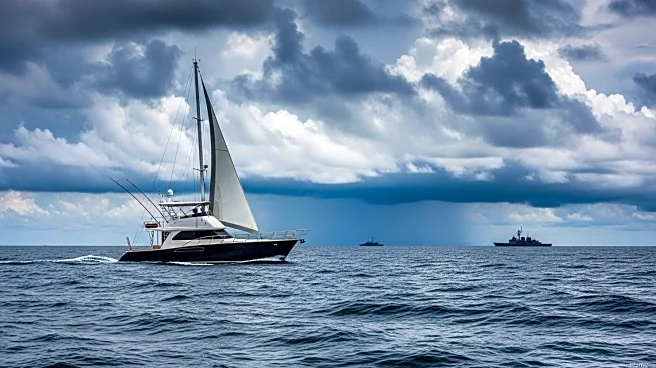What is the story about?
What's Happening?
Venezuela has accused the United States Navy of illegally boarding a Venezuelan tuna boat in the Caribbean, escalating tensions between the two nations. According to Venezuela's Foreign Minister Yván Gil, the incident involved a U.S. Navy destroyer boarding the vessel with 18 armed personnel, who remained on board for eight hours, preventing communication and normal activities of the fishermen. The Venezuelan government claims the boat had authorization from the Ministry of Fisheries to operate in the area. The U.S. has not provided evidence to support its claims of drug-related activity on the vessel. Venezuelan officials have condemned the action as illegal and illegitimate, warning of a defense against any further provocations.
Why It's Important?
This incident highlights the strained relations between Venezuela and the United States, particularly in the context of U.S. military operations in the Caribbean aimed at combating drug cartels. The Venezuelan government views the boarding as a provocation that could justify military escalation, potentially impacting regional stability. The U.S. has accused Venezuelan President Nicolás Maduro of leading a drug cartel, increasing the reward for his capture. The situation could affect diplomatic relations and economic interactions between the two countries, with potential implications for regional security and international trade.
What's Next?
Venezuela has warned of defending its sovereignty against further provocations, suggesting potential military or diplomatic responses. The U.S. government has not indicated plans for a ground incursion despite deploying over 4,000 troops in the area. The international community may call for dialogue to prevent escalation. Monitoring of U.S. military activities in the Caribbean and Venezuela's responses will be crucial in assessing future developments.
Beyond the Headlines
The incident raises questions about international maritime law and the rights of nations to protect their economic zones. It also underscores the geopolitical dynamics in the Caribbean, where U.S. military presence is viewed with suspicion by some Latin American countries. The broader implications for U.S.-Venezuela relations could influence regional alliances and economic policies.















